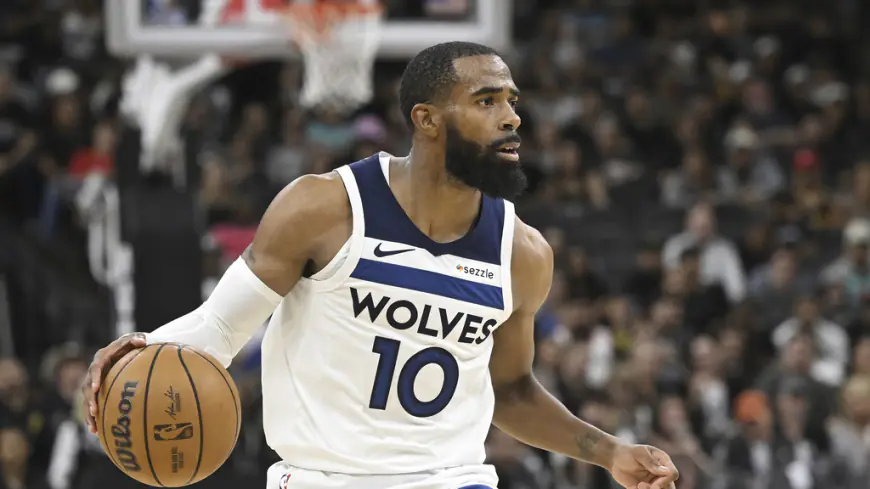Timberwolves: Value of point guard becoming abundantly clear with Conley returning
The Wolves simply haven't found offensive fluidity this season when Mike Conley isn't on the floor.

The Timberwolves have shot sub-43% in all four games played without Mike Conley this season. Subsequently, those were four losses — including Minnesota’s previous three games leading up to Conley’s return from a sprained toe Wednesday against the Kings.
Though Conley himself has struggled to knock down shots this year and, at times, appeared to be out of rhythm, his absence is a reminder of his impact on others around him.
The Wolves simply haven’t found offensive fluidity this season when he isn’t on the floor. And it’s most greatly affected the play of Minnesota’s off-ball players. Here are the 3-point shooting percentages of Jaden McDaniels, Naz Reid and Donte DiVincenzo this season when they are on the floor with and without Conley:
McDaniels
With Conley: 35.2%
Without Conley: 24.3%
DiVincenzo
With Conley: 43.8%
Without Conley: 27.9%
Reid
With Conley: 53.8%
Without Conley: 34.3%
You could chalk that up to shooting variance. The Timberwolves are only 17 games into the season. Not everything is causational. The reality is, whether Conley is on the floor or not, Minnesota has generated open shot attempts.
But the ways in which those shots are created are vastly different. When Conley is on the floor, the Wolves have more rhythm and organization. So often, the open threes Minnesota produces when he’s not in the game are the result of isolation kickouts occurring after endless dribbling from Anthony Edwards or Julius Randle where the shooter has watched idly from outside the arc up until catching the ball.
Coach Chris Finch noted that the Timberwolves’ inability to knock down open shots may be leading to more isolation basketball, but conceded that could be a “chicken or the egg” situation.
“When we have created shots, we haven’t made them consistently, yet. That’ll come when we create more consistent flow,” he said. “But we still need people to put the ball in the basket.”
They’ve done so at a higher rate this season with Conley in the game. Minnesota has also more consistently closed close contests when the veteran is on the floor. The Wolves have dropped consecutive games that have come down to the final possession in regulation, an area that was previously a strong suit.
The Wolves have played eight games already this season in which the contest was within two points in the final two minutes of the game. They are 4-1 in the five such games in which Conley has been on the floor in those spots, and 0-3 when he’s not. The Wolves’ offense stagnated greatly late in Tuesday’s loss to Houston.
Over a nine-minute stretch spanning the final nine minutes of regulation and the first four minutes of overtime, the Wolves didn’t score a single point that wasn’t the result of an offensive rebound.
“I thought we were a little too frantic at the end of the game. I was trying to get some play calls out there, but guys were just breaking it off, going when they thought they had an opportunity,” Finch said. “Having said that, we still benefited from some good looks that we didn’t knock down. We put a lot of pressure on the rim. But we needed to be a little bit more organized there, for sure.”
Organization is a Conley specialty. He supplies so much as the floor general that’s difficult to quantify, from play calls to getting guys the ball at the right times in the right spots. Donte DiVincenzo and Nickeil Alexander-Walker have struggled to pick up those responsibilities whenever Conley isn’t on the floor, and have looked to be worse versions of themselves when asked to try. They are not alone. Wolves fans will remember how poorly Brad Beal and Devin Booker played for much of the first-round playoff series in the spring when asked to operate Phoenix’s offense against the Wolves’ ball-pressuring defense.
Alexander-Walker’s best stretch of play in Tuesday’s game came when he played alongside Dillingham.
Minnesota has struggled to fill the void left by the offseason departures of Jordan McLaughlin, Kyle Anderson and Monte Morris. The Wolves have turned the ball over too often.
The issues only multiply when Conley isn’t on the floor.
Rookie guard Rob Dillingham is the only other point guard on the full-time roster. He’s gained more opportunity in Conley’s absence, and the 19-year-old has taken advantage of his opportunities. But Dillingham can’t play the whole game, and Conley possesses the experience and knowledge necessary to successfully navigate key situations.
Plus, with Conley’s return, the Wolves gained the opportunity to have a point guard on the floor for all 48 minutes, if they choose to.
“I think it’s evident that our rhythm is affected (when we don’t have one out there),” Finch said. “Oftentimes, Ant and Julius probably feel that they’ve got to do too much too early in the offense. Yeah, for sure, Rob’s play of late has definitely revealed that for us.”
What's Your Reaction?









































































































